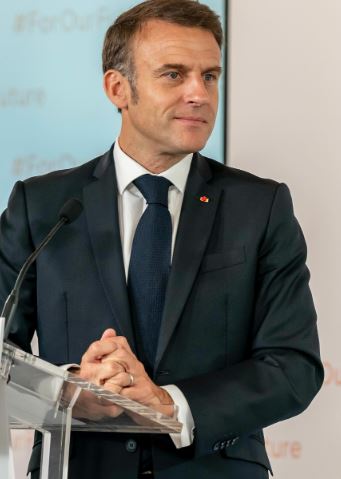Macron’s Misstep: Unraveling France’s Political Quagmire
Emmanuel Macron, once the harbinger of political reform in France, finds himself entangled in the aftermath of a strategic miscalculation that has reshaped the nation’s political landscape. His decision to call snap elections, ostensibly to preempt mounting opposition and bolster his waning authority, has instead catalyzed a seismic shift that reverberates through the corridors of power in Paris.
In a swift and surprising move reminiscent of high-stakes political maneuvers, Macron dissolved the National Assembly amidst rising far-right sentiment, exemplified by the National Rally’s (NR) recent electoral gains. His gambit, aimed at consolidating power and thwarting extremist rhetoric, encountered unforeseen resistance from an electorate weary of unilateral decrees and seeking broader consensus.
The electoral fallout, characterized by a fractured legislative assembly, reflects France’s dichotomous political landscape. The emergence of the New Popular Front (NPF) as a formidable coalition, eclipsing Macron’s centrist Ensemble (ENS) party, underscores a paradigmatic shift towards leftist alliances. This realignment, precipitated by tactical voting and a collective rejection of divisive ideologies, highlights the electorate’s steadfast commitment to republican values amid a climate of socio-political turbulence.
Central to Macron’s electoral strategy was the assumption that preemptive elections would provide clarity and consolidate his mandate. Instead, the outcome has plunged France into uncharted political waters, marked by coalition negotiations and ideological schisms that threaten to prolong governance paralysis. With no single party securing an absolute majority, the specter of a hung parliament looms large, portending protracted legislative gridlock and administrative inertia.
The implications of Macron’s electoral setback extend beyond domestic governance to France’s global stature and diplomatic efficacy. The uncertainty generated by a weakened presidency diminishes France’s capacity to assert leadership within the European Union and on the global stage, compounding geopolitical uncertainties amidst mounting international challenges.
Critics contend that Macron’s decision to dissolve the assembly was a calculated risk that failed to resonate with a disillusioned electorate seeking stability and consensus-driven governance. His perceived detachment from public sentiment, exacerbated by protests over economic reforms and social inequalities, underscores a widening disconnect between the Elysée Palace and the French populace.
Moreover, Macron’s authoritarian style, often likened to imperial governance, has alienated segments of the electorate, undermining his political capital and exacerbating intra-coalition tensions within Ensemble. The resultant fissures within Macron’s party, coupled with coalition negotiations among rival factions, portend a protracted period of political uncertainty and legislative inertia.
As France navigates this unprecedented political landscape, characterized by coalition politics and ideological polarization, the specter of Marine Le Pen’s resurgent National Rally looms ominously on the horizon. While the NR’s electoral gains were tempered by strategic coalition-building among centrist and leftist factions, the resurgence of far-right populism underscores enduring societal divisions and the fragility of democratic norms.
Looking ahead, Macron faces an uphill battle to restore public trust and navigate France through the turbulent waters of economic recovery and societal cohesion. His mandate, now challenged by coalition dynamics and legislative gridlock, necessitates a recalibration of governance strategies to foster consensus and address systemic challenges with equanimity and foresight.
In conclusion, Emmanuel Macron’s electoral misstep has precipitated a seismic shift in French politics, relegating him to a precarious position of diminished authority and political uncertainty. The repercussions of his strategic gamble reverberate across France’s political spectrum, underscoring the imperative for inclusive governance and consensus-driven policies in navigating the nation’s complex socio-political landscape.

Sunil Garnayak is an expert in Indian news with extensive knowledge of the nation’s political, social, and economic landscape and international relations. With years of experience in journalism, Sunil delivers in-depth analysis and accurate reporting that keeps readers informed about the latest developments in India. His commitment to factual accuracy and nuanced storytelling ensures that his articles provide valuable insights into the country’s most pressing issues.



